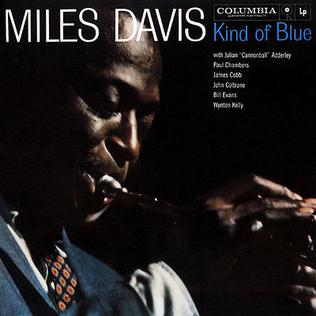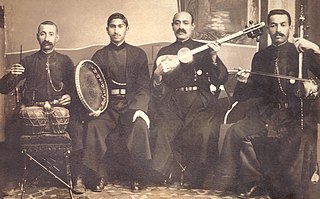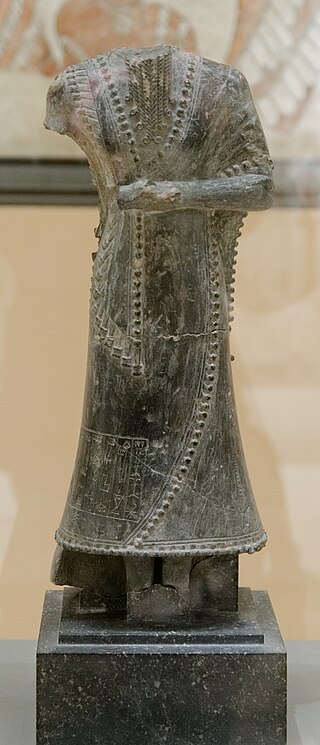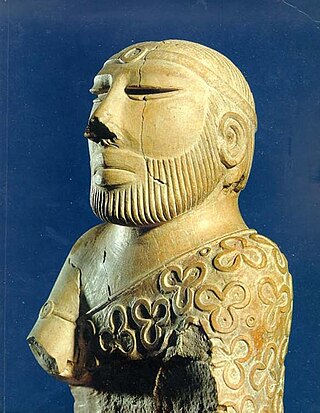Related Research Articles
In linguistics, voicelessness is the property of sounds being pronounced without the larynx vibrating. Phonologically, it is a type of phonation, which contrasts with other states of the larynx, but some object that the word phonation implies voicing and that voicelessness is the lack of phonation.
Modal jazz is jazz that makes use of musical modes, often modulating among them to accompany the chords instead of relying on one tonal center used across the piece. Although precedents exist, modal jazz was crystallized as a theory by composer George Russell in his 1953 book Lydian Chromatic Concept of Tonal Organization.
In linguistics, modal particles are always uninflected words, and are a type of grammatical particle. They are used to indicate how the speaker thinks that the content of the sentence relates to the participants' common knowledge or to add emotion to the meaning of the sentence. Languages that use many modal particles in their spoken form include Dutch, Danish, German, Hungarian, Russian, Telugu, Nepali, Norwegian, Indonesian, Chinese and Japanese. The translation is often not straightforward and depends on the context.

Kind of Blue is the fifth studio album released on Columbia, and twenty-eighth overall, by the American jazz musician, trumpeter, composer, and bandleader Miles Davis. It was recorded on March 2 and April 22, 1959, at Columbia's 30th Street Studio in New York City, and released on August 17 of that same year by Columbia Records. For the recording, Davis led a sextet featuring saxophonists John Coltrane and Julian "Cannonball" Adderley, pianist Bill Evans, bassist Paul Chambers, and drummer Jimmy Cobb, with new band pianist Wynton Kelly appearing on one track – "Freddie Freeloader" – in place of Evans.
Modal logic is a kind of logic used to represent statements about necessity and possibility. It plays a major role in philosophy and related fields as a tool for understanding concepts such as knowledge, obligation, and causation. For instance, in epistemic modal logic, the formula can be used to represent the statement that is known. In deontic modal logic, that same formula can represent that is a moral obligation.

Auriculotherapy is a form of alternative medicine based on the idea that the ear is a micro system and an external organ, which reflects the entire body, represented on the auricle, the outer portion of the ear. Conditions affecting the physical, mental or emotional health of the patient are assumed to be treatable by stimulation of the surface of the ear exclusively. Similar mappings are used by several modalities, including the practices of reflexology and iridology. These mappings are not based on or supported by any medical or scientific evidence, and are therefore considered to be pseudoscience.

The Daihatsu Terios is a mini SUV produced by the Japanese automobile manufacturer Daihatsu since 1997 as the successor to the F300 series Rocky. It was initially offered in both short- and long-wheelbase configurations before the former stopped production in 2016 to be replaced by the A200 series Rocky crossover in 2019. The long-wheelbase variant is available mainly for the Indonesian market with three-row seating options. A smaller kei car model called the Terios Kid/Lucia was also available for the first-generation model.
A modal verb is a type of verb that contextually indicates a modality such as a likelihood, ability, permission, request, capacity, suggestion, order, obligation, necessity, possibility or advice. Modal verbs generally accompany the base (infinitive) form of another verb having semantic content. In English, the modal verbs commonly used are can, could, may, might, shall, should, will, would, ought to, used to and dare.
Hilot (/HEE-lot/) is an ancient Filipino art of healing. It uses manipulation and massage to achieve the treatment outcome, although techniques differ from one practitioner to another. It emerged from the shamanic tradition of the ancient Filipinos with healers considering their practice as derived from their calling from visions or from having been born by breech.
In linguistics, evidentiality is, broadly, the indication of the nature of evidence for a given statement; that is, whether evidence exists for the statement and if so, what kind. An evidential is the particular grammatical element that indicates evidentiality. Languages with only a single evidential have had terms such as mediative, médiatif, médiaphorique, and indirective used instead of evidential.
Modal realism is the view propounded by philosopher David Lewis that all possible worlds are real in the same way as is the actual world: they are "of a kind with this world of ours." It is based on four tenets: possible worlds exist, possible worlds are not different in kind from the actual world, possible worlds are irreducible entities, and the term actual in actual world is indexical, i.e. any subject can declare their world to be the actual one, much as they label the place they are "here" and the time they are "now".
In semiotics, a modality is a particular way in which information is to be encoded for presentation to humans, i.e. to the type of sign and to the status of reality ascribed to or claimed by a sign, text, or genre. It is more closely associated with the semiotics of Charles Peirce (1839–1914) than Ferdinand de Saussure (1857–1913) because meaning is conceived as an effect of a set of signs. In the Peircean model, a reference is made to an object when the sign is interpreted recursively by another sign, a conception of meaning that does in fact imply a classification of sign types.

Mugham or Mughamat is one of the many classical compositions from Azerbaijan, contrasting with tasnif and ashik.

1958 Miles is a compilation album by American jazz musician Miles Davis, released in 1974 on CBS/Sony. Recording sessions for tracks that appear on the album took place on May 26, 1958, at Columbia's 30th Street Studio and September 9, 1958, at the Plaza Hotel in New York City. 1958 Miles consists of three songs featured on side two of the LP album Jazz Track, which was released in November 1959, one song from the same session not appearing in the album, and three recordings from Davis' live performance at the Plaza Hotel with his ensemble sextet. The recording date at 30th Street Studio served as the first documented session to feature pianist Bill Evans performing in Davis' group.

In Turkic mythology, Tepegoz or Tepegöz is a legendary creature who has only one eye on his forehead – a kind of cyclops. He is an ogre that appears in the Book of Dede Korkut, a famous epic story of the Oghuz Turks.
"Nardis" is a composition by American jazz trumpeter Miles Davis. It was written in 1958, during Davis's modal period, to be played by Cannonball Adderley for the album Portrait of Cannonball. The piece has come to be associated with pianist Bill Evans, who performed and recorded it many times.

The Statue of Iddi-Ilum is a 21st-century BCE statue of the praying figure of Iddi-ilum, the military governor, or Shakkanakku, of the ancient city-state of Mari in eastern Syria. The headless statue was discovered at the Royal Palace of Mari during excavations directed by French archaeologist André Parrot. The statue was made of soapstone and bears an inscription identifying the figure and dedicating it to the goddess Ishtar or Inanna. The statue is now displayed at the Musée du Louvre in Paris. He was contemporary of the Third Dynasty of Ur, and probably their vassal.

The bushel with ibex motifs, also known as the beaker with ibex motifs, is a prehistoric pottery artifact originating from Susa, an ancient city in the Near East located in modern-day Iran. This piece of art is believed to have been created during the Susa I period, between 4200 and 3500 BCE. The bushel is a large vessel, measuring 28.9 x 16.4 cm, and was used as a funerary item among the first inhabitants of Susa.
Free choice is a phenomenon in natural language where a linguistic disjunction appears to receive a logical conjunctive interpretation when it interacts with a modal operator. For example, the following English sentences can be interpreted to mean that the addressee can watch a movie and that they can also play video games, depending on their preference:
- You can watch a movie or play video games.
- You can watch a movie or you can play video games.

The Priest-King, in Pakistan often King-Priest, is a small male figure sculpted in steatite found during the excavation of the ruined Bronze Age city of Mohenjo-daro in Sindh, Pakistan, in 1925–26. It is dated to around 2000–1900 BCE, in Mohenjo-daro's Late Period, and is "the most famous stone sculpture" of the Indus Valley civilization ("IVC"). It is now in the collection of the National Museum of Pakistan as NMP 50-852. It is widely admired, as "the sculptor combined naturalistic detail with stylized forms to create a powerful image that appears much bigger than it actually is," and excepting possibly the Pashupati Seal, "nothing has come to symbolize the Indus Civilization better."
References
- ↑ (in Chinese)Teyipcan & Hao Guanzhong. Aluzi shilü , Encyclopedia of China (Chinese Literature Edition), 1st ed.